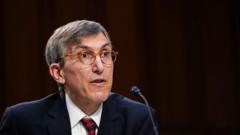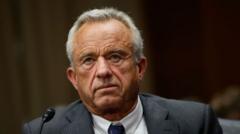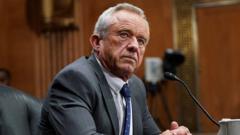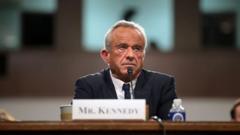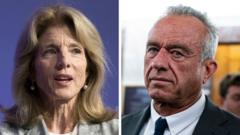Robert F. Kennedy Jr. embarks on an ambitious quest to reshape America’s dietary landscape, targeting ultra-processed foods and food safety regulations as he heads towards potential leadership at the Department of Health and Human Services.
Can RFK Jr Transform America’s Food Culture?
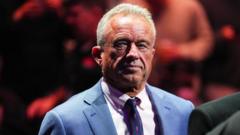
Can RFK Jr Transform America’s Food Culture?
Kennedy’s bold plans aim to combat unhealthy eating habits and reform food regulations.
Robert F. Kennedy Jr., the President-elect Donald Trump's choice for the head of the Department of Health and Human Services (DHHS), has made it clear that he intends to revolutionize how Americans approach food and drink. With a keen focus on the dangers of ultra-processed foods, food additives, and dyes, Kennedy has raised alarm bells about ingredients he believes jeopardize public health. At a November rally, he asserted, “We are betraying our children by letting [food] industries poison them,” a sentiment that echoes his longstanding criticism of the food industry.
However, Kennedy's initiative to reform America's dietary habits will necessitate significant alterations to existing food regulations and will likely face resistance from the powerful food industry. Marion Nestle, a former professor of nutrition at New York University, has voiced doubts regarding whether Trump will support Kennedy's agenda, highlighting the uphill battle he faces: “What he's suggesting is taking on the food industry.”
Kennedy, who has a controversial past regarding public health claims—having previously made unfounded assertions about vaccines and WiFi—has nevertheless received backing from some health advocates and policymakers for his focus on food reform. Colorado Governor Jared Polis expressed on social media that Kennedy’s leadership could significantly impact health policies in the nation, stating he would help to “make America healthy again,” while also stressing that “science must remain THE cornerstone of our nation’s health policy.”
Under his “Make America Healthy Again” campaign slogan, Kennedy has proposed eliminating ultra-processed foods, which are high in harmful additives and linked to chronic diseases such as diabetes and cancer. He has particularly targeted the nutritional quality of school lunches, lamenting the current situation where children consume unhealthy food options.
Kennedy's mandate would likely include overseeing the FDA, an agency responsible for the safety of food and drugs, currently criticized for its transparency and efficacy. He has expressed intentions to overhaul the organization, suggesting that entire departments, especially those focusing on nutrition, are ineffective and must be disbanded. Moreover, he has called for the removal of harmful food dyes and the ban on certain oils that he claims are detrimental to health.
Kennedy’s objective for food reform aligns with contemporary public health concerns, as experts recognize the increasing rates of ultra-processed food consumption among Americans. Nested within this discourse is the support he has received from health specialists who see potential in his ideas. Dr. Peter Lurie, a former FDA official, acknowledged that strategies targeting food additives and dyes could usher in positive change.
Nonetheless, Kennedy’s strategies are not without criticism. Some public health professionals argue that certain positions he holds, such as the promotion of raw milk and the removal of fluoride from drinking water, might carry serious health risks. Findings suggest that raw milk can be a source of foodborne illnesses, and the benefits of fluoridated water for dental health are well-documented.
As Kennedy advocates for strict measures against pesticides and genetically modified organisms, he may face pushback from the agricultural sector, which has generally benefited from a hands-off regulatory approach. Moreover, given Trump’s history as a fast-food aficionado, Kennedy’s agenda might clash with the president's preferences, raising questions about the feasibility of his reforms within the current administration.
Industry representatives have preemptively mobilized against Kennedy’s proposals, emphasizing a desire for food policies grounded in scientific evidence rather than sweeping regulatory changes. Jeff Hutt, representing the “Make America Healthy Again” political action committee, maintained that even the conversation around banning ultra-processed foods is crucial.
Looking ahead, Kennedy has the potential to enact changes while working within existing frameworks, such as updating the US Dietary Guidelines, which could influence food policy across various sectors, including education and federal programs. However, significant concerns linger over his approach, especially his willingness to terminate FDA personnel.
As health professionals weigh Kennedy’s agenda against his complicated credibility, opinions are divided. While there is room to spearhead meaningful reforms, many caution that the road ahead is fraught with obstacles, not only from food industries but also from the public and political realm. As such, while Kennedy’s ambitions hold promise, they are met with skepticism regarding their practical execution in an established and resistant food regulatory landscape.







